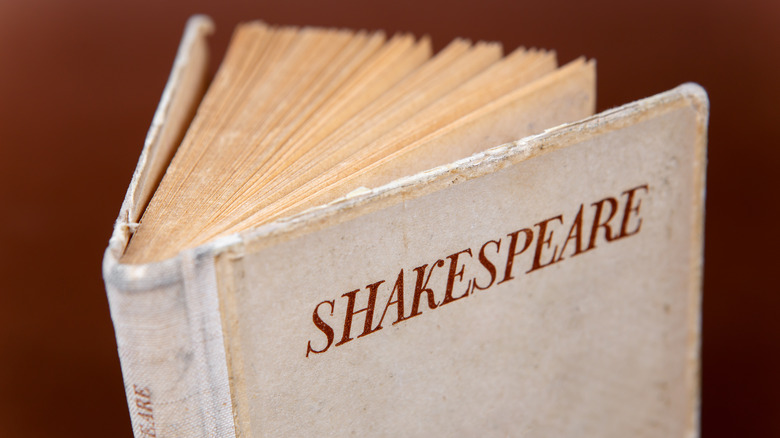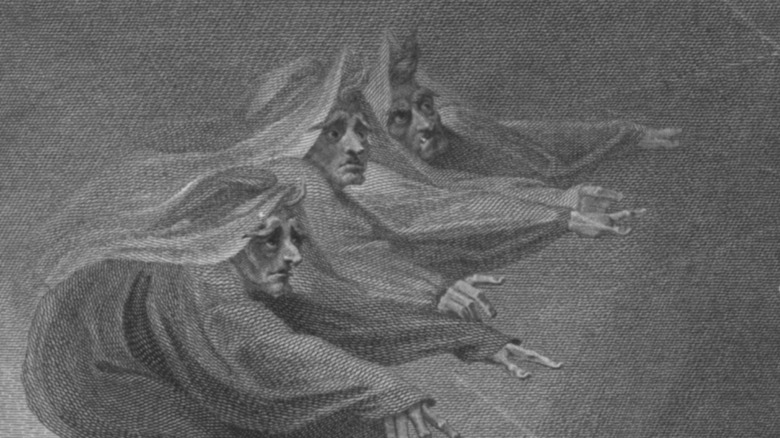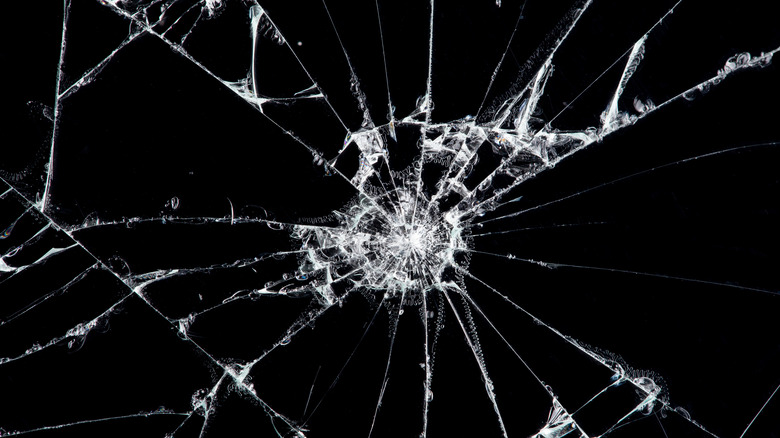The Dark Reason Actors Refuse To Say The Word Macbeth
If you've ever been part of a theatrical production, particularly one of Shakespearean origin, you've no doubt heard the superstition: Never, ever say "Macbeth" aloud in a theater. You never know what could happen if you do — everything from lousy performances to literal deaths have been blamed on the breaking of the taboo. Even if you're performing "Macbeth," you're not allowed to say the name; say "The Scottish Tragedy" instead.
Why the superstition? And why "Macbeth" in particular? While "Macbeth" is hardly Shakespeare's bleakest tragedy (that award would probably go to "Titus Andronicus"), it does have something a lot of his other plays lack: a depiction of witchcraft. Some Shakespeare historians will tell you there's a pretty good reason for that — namely, a guy known as "King James."
In 1603, King James VI of Scotland ascended to the English throne, becoming King James I of England. During his tenure as the Scottish king, though, James had become obsessed with witchcraft after blaming witches for a nautical mishap. While sitting on the throne, James had written and published "Daemonologie," a treatise on witches, necromancers, and fairies (via No Sweat Shakespeare). Apparently inspired by the new king's proclivities, Shakespeare wrote "Macbeth," the story of a Scottish nobleman who murders his way to the throne at the behest of a trio of witches. And when you write stuff like that, you're sort of asking for a curse.
Why Macbeth is cursed
The earliest whisperings of a curse are solidly in the realm of folklore, with little contemporary evidence to confirm them. Still, the curse was allegedly there from the first performance. As rumor has it (per the Royal Shakespeare Company), Shakespeare angered a real witches' coven by basing his portrayal of witchcraft directly on James' (apparently accurate?) treatise, and they put a hex on the play (via The Austin Chronicle). It's said that the actor cast as Macbeth's wife died before the world premiere, forcing Shakespeare himself to take on the role at the last minute (male actors played all the roles in a play, including female roles, at the time).
In the years since, though, there have been plenty of well-documented disasters involving performances of "Macbeth." In the 17th century, according to History, the actor playing the character of Duncan was killed onstage in an Amsterdam performance when a real knife was mistakenly used instead of a prop. A similar incident occurred in 1947, when actor Harold Norman was killed while playing Macduff (via The Cairns Post), and in 1937, Laurence Olivier — possibly the most famous Shakespearean actor of all time — was nearly killed when a falling stage weight barely missed him during a London performance. The weight broke his sword, which in turn flew into off the stage and struck an audience member; he had a heart attack which later killed him.
All that, however, is nothing compared to the literal riots the play has caused.
The Macbeth riot
While History gives passing mention to riots that occurred in 1721 and 1771, the worst was undoubtedly New York City's Astor Place Riot, which left more than 20 dead and more than 100 injured in 1849. Two different New York theaters, just a few blocks apart, were staging productions of "Macbeth" on the same night. One theater, the Astor Place, catered mostly to an upscale clientele and featured primarily British actors, while the other, the Bowery, featured American actors and was a favorite of the working class.
There were already class tensions swirling in New York, but when the Astor Place brought in William Charles Macready — universally reviled among the working class for his "fey" performances of the Bard — to play Macbeth, it was a bridge too far for fans of American actor Edwin Forrest, who was playing Macbeth simultaneously at the Bowery. The working class drama fans ended up infiltrating the Astor's audience and attacking the theater from both inside and out, throwing rocks through windows, breaking plumbing, and starting fires. In the ensuing riot, New York was forced to call in the military, commanded by Major General Charles Sandford (quoted at Smithsonian), who later wrote, "During a period of 35 years of military service, I have never seen a mob so violent as the one on that evening."
So, never say "Macbeth." We're not saying you'll cause a historically deadly riot if you do — but why risk it, right?
(Joel Cohen's new movie, "The Tragedy of Macbeth," premieres September 24 as the opening night film of the New York Film Festival.)


